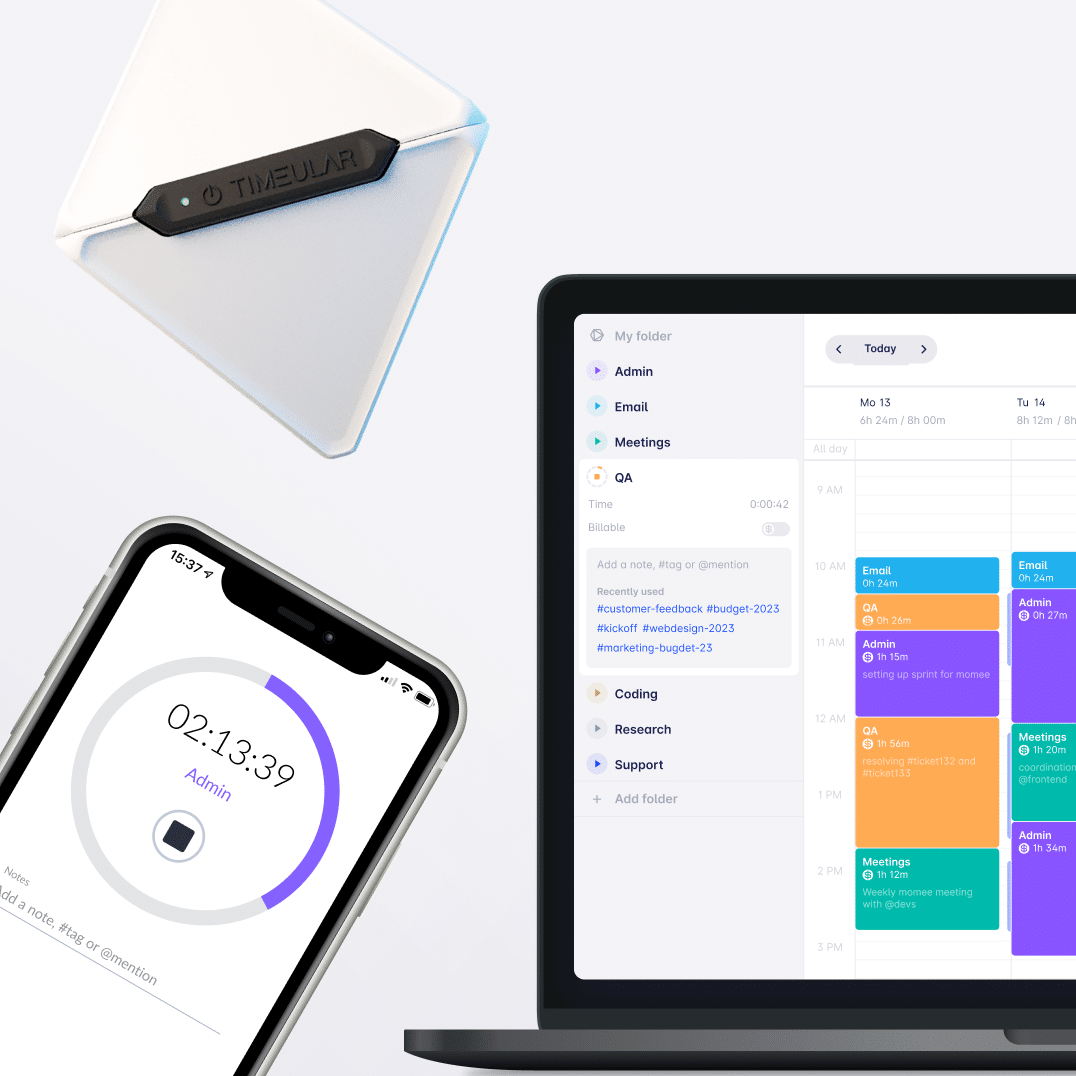Performance Review Tips for Employees
Ready to master your performance reviews? This article is here to guide you with a few tips and strategies helping you navigate and excel in these critical evaluations.
Learn how to effectively showcase your achievements and potential, paving the way for your professional growth and career advancement.
Use this opportunity to turn performance conversations into a stepping stone for recognition and success in your workplace.
Let’s take a deeper look at the best performance review tips for employees.

Looking for a time tracking solution to complement your performance management software?
What is a performance review?
A performance review is an evaluation where an employee’s job performance is assessed regularly, such as yearly or quarterly. This kind of meeting identifies their strengths and areas that need optimization, provides feedback, and sets their future performance goals.
A performance conversation is a two-way discussion between the employee and employer, focusing on evaluating past performance, achievements and future growth. The aim is to support the employee’s professional development and benefit both the individual and the company.
Why are performance reviews important?
Employee performance reviews, often underestimated, play a crucial role in recognizing your skills and assessing your potential for growth within the company.
They help to encourage employees for further growth and present an excellent opportunity to recognize and appreciate top performers.
Let’s delve into why performance conversations are so important.
Honest and meaningful conversation
Performance reviews provide the perfect opportunity for both managers and employees to engage in candid discussions about their experiences and how to enhance them.
Feedback
Performance conversations offer comprehensive feedback on your work, highlighting what’s working well and which areas require improvement. During a performance appraisal meeting managers evaluate employee performance and share it with the employee to make sure that everyone is on the same page.
Performance management
Tracking employee performance is challenging without a formal review process. Setting work goals and evaluating progress during an effective employee performance review, is essential for achieving real development and goal attainment, as well as to evaluate the big picture.
- Read also: How to track employee performance
Identifying highly productive employees
Performance reviews enable managers to identify highly productive employees who consistently deliver results. Recognizing high performers, and rewarding their talent is crucial, especially when managing high-performing individuals.
Motivation
Motivation is a key driver in performance reviews, inspiring employees to achieve even better results in the future. Regardless of past employee success, there’s always room for improvement, and fostering motivation during a performance review can provide the boost everyone needs.
Setting goals
An essential part of an annual performance review is a conversation about your career goals and company goals for the upcoming year. To set goals which are within your reach, read our article “Why it’s important to set realistic goals“.
Performance review tips for employees

Suggest frequent performance reviews
When is your next performance review?
Having just an annual performance review can be stressful due to the accumulation of a year’s work. To alleviate this, recommend having more regular evaluations, such as a bi-annual or a quarterly review.
This proactive approach not only reduces the anxiety associated with a single annual review but also provides ongoing feedback.
With more frequent evaluations and more feedback, you can continuously adjust and improve your performance, leading to more tremendous personal and company success.
Review previous performance evaluations
Take the time to carefully review your previous employee’s performance evaluations, enabling you to effectively gauge and understand your development and growth over time.
This thorough analysis of past performance reviews is crucial as it helps you accurately identify the areas where you have shown notable improvement, as well as those aspects of your work that still require additional focus and continued development.

Keep track of your progress
As your performance review comes up, it’s a good idea for you to put together a list of all the great stuff you’ve done at work and what you plan to tackle next.
Doing this works best when you’ve been keeping track of your goals and what you’ve achieved along the way.
This way, you’ve got a handy reference for your next performance appraisals, and a clear idea of where you’re headed in your job.
Practice self-reflection
Before your performance review, take the time for some in-depth self-reflection. Think carefully about your strong points, areas where you may need improvement, and aspects of your work where you’ve noticed personal progress.
This deep self-analysis not only helps you understand your own professional journey better but also sets a firm groundwork for more meaningful performance conversations and productive discussions.
Reflecting on your experiences and achievements prepares you to engage more effectively in the performance evaluation process.
Gather your accomplishments
Compiling a record of your achievements serves as a tangible showcase of your hard work, dedication, and progress over the specific period. This way you not only demonstrate your value and impact within the company but also reinforce your commitment to your role.
This preparation allows you to confidently articulate your contributions, making a compelling case for recognition, career advancement, or professional development opportunities.
Furthermore, it aids in self-reflection, helping you to identify your strengths and identify areas for growth, which can guide meaningful discussions about your career path during the next review cycle.
Discuss obstacles and solutions
Addressing challenges and their resolutions is valuable as it demonstrates your problem-solving skills and proactive attitude. By openly addressing the challenges you’ve encountered (i.e. a how to meet deadlines), you show a willingness to learn from difficulties and adapt.
This discussion also provides an opportunity for you and your team leader to collaborate on finding effective solutions fostering a supportive work environment. It highlights your commitment to continuous improvement and your ability to handle adversity, which are key qualities for professional growth and success.
Additionally, it can lead to actionable strategies that benefit not just your personal development but also the other team members and organization as a whole.
Accept help when you need it
It’s important to remember that encountering challenges is a normal part of any job. Recognizing and embracing the support available to you is a sign of professional maturity. Be prepared to discuss any challenges you’ve faced.
By openly welcoming support and guidance, you show a commitment to overcoming obstacles and a dedication to your ongoing development within the company.

Prepare questions for your manager
By asking insightful questions, you not only gain clarity on various aspects of your job and the company’s future direction but also show initiative and a forward-thinking mindset.
This preparation helps in creating a two-way dialogue, making the meeting more interactive and beneficial. It allows you to steer part of performance conversations towards areas you feel are important for your career development and shows your manager that you are actively thinking about how to contribute to and grow within the company.
Moreover, it can lead to valuable insights and guidance that can shape your professional journey.
Get prepared for your performance review
A key tip for employees facing performance reviews is to be thoroughly prepared. After the employee performance review date is scheduled, make sure you have all your discussion points organized and ready.
This includes analyzing job-related results and key performance indicators and understanding the reasons behind them.
Also, anticipate potential follow-up questions about specific aspects of your work and be ready to explain the outcomes. This comprehensive preparation ensures you’re equipped to engage effectively in the process.
Engage actively in your performance reviews
It’s important to actively contribute to the dialogue in your performance review, ensuring a balanced exchange between you and your superiors. This balance enables a comprehensive, transparent, and sincere discussion about performance issues and both parties’ expectations and plans regarding your role.
Get ready by preparing topics to discuss, such as both sides’ expectations from the employer and potential areas for improvement. This active engagement helps create a more productive and meaningful self-assessment and review experience.
Communicate your ambitions and career aspirations
Take the time to clearly and thoroughly communicate your career ambitions and how they resonate with the company’s broader vision and objectives. By articulating these aspirations in detail, you provide your manager with a deeper understanding of your long-term professional objectives.
This clarity assists them in recognizing how they can facilitate and support your career trajectory within the organization.
Discussing your aspirations not only aligns your goals with the company’s direction but also opens up avenues for future growth opportunities and potential mentorship, enhancing your professional development journey.
Plan for work-life balance
Addressing work-life balance demonstrates that you are aware of the importance of managing stress and are committed to sustaining high productivity levels without compromising your well-being.
By bringing this topic into the performance review conversation, you can collaborate with your manager to find solutions or make adjustments to your work schedule or workload. This not only benefits your health and well-being but also contributes positively to your overall job satisfaction and efficiency.
Demonstrate learning and adaptation
It involves explaining how past feedback and experiences have improved your work approach. This could be how you changed strategies after a project challenge or applied constructive criticism to gain new skills or adjust your work style.
Sharing these examples highlights your self-reflection, learning ability, and flexibility in handling challenges. These qualities display your resilience and commitment to professional growth, benefiting both your personal development and the organization.
TIP: Here you have some of the best training courses
Highlight initiative and innovation
Highlighting initiative and innovation in your performance reviews means discussing specific examples where you took charge, introduced new ideas, or made improvements.
This could be solving a problem, giving feedback, suggesting a new project approach, or streamlining a process. Showcasing these instances demonstrates your creative thinking and willingness to exceed your basic job duties.
Recognize your value in the team
During performance reviews, highlight how your contributions have positively influenced the other team member and company. Identify instances where your abilities solved problems or brought innovation.
Acknowledging your own strengths helps your manager understand your distinct role in the team.
This not only boosts your self-worth but also encourages the continued development and application of your skills for the other team member’s collective success.
Evaluate your job satisfaction
Assess your job satisfaction by considering not only your daily tasks but also your work-life balance, how your role aligns with the company’s values, and the perks offered.
Reflect on the aspects of your job that you enjoy, alongside any areas for improvement, including the balance between your professional and personal life.
Discussing these elements can lead to meaningful changes, ensuring your role is not only fulfilling but also harmonious with your lifestyle and values and that you fully benefit from the perks your company provides.
Document important details and your superiors’ feedback
In your performance review meeting, you’ll receive crucial information and feedback that are important for your future work. Bring a laptop or use pen and paper to carefully record all the essential details discussed.
Writing down everything, especially points you must remember, is vital for your next goals and achievements.
Additionally, the act of note-taking aids in processing and memorizing the information, making it a valuable tool for your ongoing professional development.
Prepare well-thought feedback for your managers
Receiving feedback from managers aids your professional growth, but offering them your feedback is equally vital for shared understanding, mutual development, and team enhancement. Improvement benefits all, from staff to leadership.
Utilize your experiences to give concise, constructive feedback in your review, creating development opportunities for both you and your managers and promoting a collaborative work environment.

Offer constructive feedback about the review process
It’s important to not only participate in the performance review process but also to provide thoughtful feedback on how the process is conducted.
Share your perspectives and suggest potential enhancements that could make future reviews more impactful and beneficial.
By offering constructive criticism on the review methodology, you contribute to refining the process, ensuring that it becomes more tailored and effective for both you and your colleagues.
Conclusion
The conclusion taken from this article is that effective performance reviews are essential for every employee’s personal and professional growth.
The best performance review tips for employees enlisted in this article will help you to excel and get the most out of your effective performance review. With the knowledge about what distinguishes effective performance reviews, you are well-prepared to take your career to the next level.
Whatever the result may be, even if your review is not that good, what matters is that you’ll be able to see what the company requires from you and how you can achieve it.
Please note: Although employee performance reviews are common in most companies, many organizations still haven’t implemented frequent check-ins with their employees. In such a case, we strongly recommend you to request feedback to get a clear understanding of your performance.
FAQ
You must list all the accomplishments you had all throughout the year before, as well as define your annual goals. It’s also essential to prepare a list of questions you may have about your future in the company and also what you would want for the following year. Finally, you must be prepared to receive feedback about your performance and also able to respond assertively about it.
A perfect employee performance review process is a regular, two-way dialogue focusing on past achievements, future growth, and comprehensive feedback, aimed at fostering professional development.
Performance management is the ongoing process of setting goals, assessing progress, and providing feedback to ensure employee growth and organizational effectiveness.
High performance refers to employees who consistently deliver exceptional results and exceed expectations, while low performance indicates those struggling to meet set objectives and standards.
You might be interested in:
